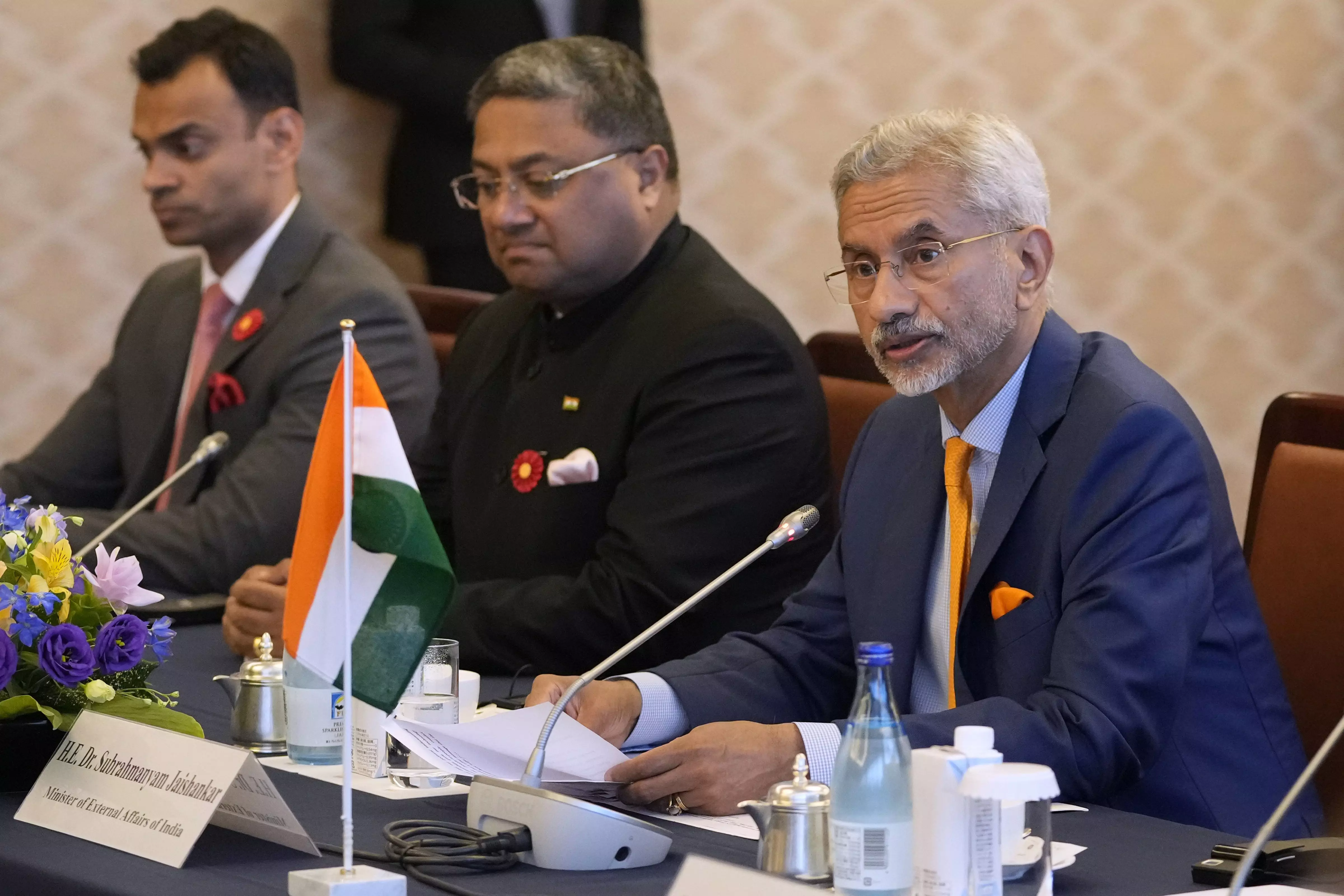Quad Denounces Aggression in China Seas, Cross-Border Terrorism, and Gaza Crisis

New Delhi: Attacking China without naming it directly, the four-nation Quad -- comprising India, the United States, Japan and Australia -- said it was “seriously concerned about the situation in the East and South China Seas and reiterated strong opposition to any unilateral actions that seek to change the status quo by force or coercion”. At the Quad foreign ministers’ meeting in Tokyo on Monday, it further “expressed serious concern about the militarisation of disputed features, and coercive and intimidating manoeuvres in the South China Sea” as well as on “the dangerous use of coast guard and maritime militia vessels, the increasing use of various kinds of dangerous manoeuvres, and efforts to disrupt other countries’ offshore resource exploitation activities”. The Quad also backed the international Arbitral verdict of 2016 that had ruled in favour of the Philippines against Chinese territorial claims in the South China Sea.
The Quad also sent a clear message to Pakistan by condemning cross-border terrorism and demanding action against the perpetrators of the 26/11 Mumbai terror attacks of 2008 and the Pathankot terror attack on India, besides demanding action against (Pakistan-based) terror groups LeT and JeM. On Ukraine, the Quad joint statement refrained from any adverse mention of Russia, perhaps due to Indian sensitivities.
The participants at the Quad meeting were external affairs minister S. Jaishankar, US secretary of state Antony J. Blinken, Japanese foreign minister Yoko Kamikawa and Australian foreign minister Penny Wong. The four nations reiterated that India would host the next Quad Leaders’ Summit later this year which is expected to be attended by the top leaders of the four nations, including US President Joe Biden.
Batting for a rules-based order in the Indo-Pacific at the meeting, Mr Jaishankar said: “It is only our collaboration that can ensure that the Indo-Pacific remains free, remains open, stable, secure and prosperous. ... It is therefore essential that our political understanding strengthens, our economic partnerships grow, our technology collaborations expand and our people-to-people comfort intensifies. Our meeting should send a clear message, that the Quad is here to stay, here to do and here to go. He added: “The overall messaging is that our four countries -- all democratic, pluralistic societies and market economies -- are working together for a free and open Indo-Pacific, for a rules-based order and for the global good.”
The EAM further said: “This (Quad) is not a talk shop but a platform that generates practical outcomes. For example, our HADR conversations are reflected in understandings and SOPs between our navies. The Indo-Pacific Maritime Domain Awareness initiative that came out of the Quad today links information fusion centres. The Open-RAN network, that we have spoken about so much, is being deployed in Palau. A space-based climate warning system will be launched soon in Mauritius.” The Quad further said it was “working for early operationalisation of the South Asia programme through the Information Fusion Centre-Indian Ocean Region (IFC-IOR) in Gurgaon, India”.
Hailing the Quad, the EAM said: “We are working from trusted telecom technology and undersea cable connectivity … to humanitarian and disaster relief (HADR), ... critical and emerging technologies, cyber and health security, climate action, infrastructure, capacity building and training, STEM education, maritime domain awareness and counter terrorism. And this, by the way, is the abbreviated list! There are 16 working groups and we have just today agreed on more things to do.”
He added: “These are not easy times. A major challenge is to ensure global economic growth, while also de-risking it. Supply chains are a particular focus for resilience, just as we push for trusted and transparent digital partnerships. ... In a sense, we are in the midst of a re-globalisation.”
The Quad joint statement, meanwhile, said: “We emphasise the importance of adherence to international law, particularly as reflected in the United Nations Convention on the Law of the Sea (UNCLOS), to address challenges to the global maritime rules-based order, including with respect to maritime claims, and in the South and East China Seas… We reiterate that the award rendered by the Arbitral Tribunal on July 12, 2016, is a significant milestone, and the basis for peacefully resolving disputes between the parties."
On terrorism, the Quad statement said: “We unequivocally condemn terrorism and violent extremism in all its forms and manifestations including cross-border terrorism. ... We strongly reiterate our condemnation of terrorist attacks, including the 26/11 Mumbai and Pathankot attacks and call for bringing the perpetrators of these attacks to justice without delay. We urge all countries to take immediate, sustained and irreversible action to prevent territory under their control from being used for terrorist purposes. ... We reiterate the call for concerted action against all UN-listed terrorist groups including Al-Qaeda, ISIS/Daesh, Lashkar e-Tayyiba (LeT), Jaish-e-Mohammad (JeM), and their proxy groups.”
Regarding the Russia-Ukraine conflict, the four nations said: “We express our deepest concern over the war raging in Ukraine including its terrible and tragic humanitarian consequences. We reiterate the need for a comprehensive, just, and lasting peace in line with international law, consistent with the purposes and principles of the UN Charter, including respect for sovereignty and territorial integrity.”
The Quad also sought to strike a balance on the Israel-Gaza issue. It said: “We unequivocally condemn the terror attacks on October 7, 2023. The large-scale loss of civilian lives and the humanitarian crisis in Gaza is unacceptable. We affirm the imperative of securing the release of all hostages held by Hamas, and emphasize that the deal to release hostages would bring an immediate and prolonged ceasefire in Gaza. We underscore the urgent need to significantly increase deliveries of life-saving humanitarian assistance throughout Gaza as well as the crucial need to prevent regional escalation. We urge all parties to comply with international law, including international humanitarian law, as applicable.”

